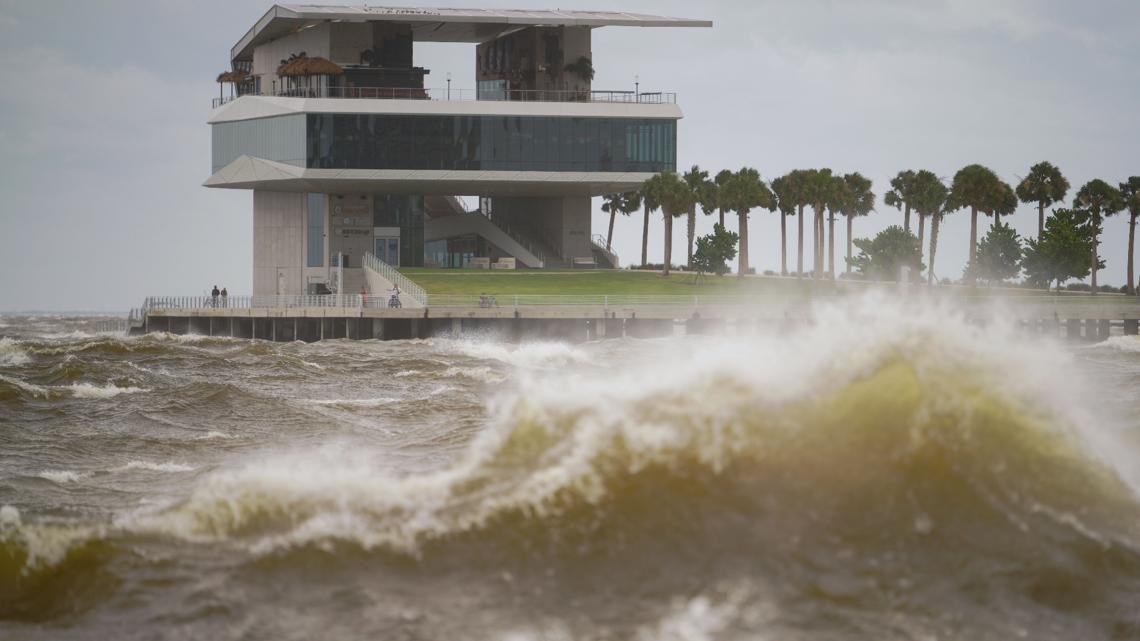cct-tracking
Hurricane Helene Strikes Florida’s Northwest Coast as a Powerful Category 4 Storm

TALLAHASSEE, Fla. — Hurricane Helene made landfall Thursday night as a Category 4 storm, bringing with it catastrophic warnings for much of the southeastern United States. Forecasters predicted the hurricane could generate a devastating storm surge alongside dangerous winds and heavy rainfall.
The storm struck the Big Bend area of Florida’s Gulf Coast near the mouth of the Aucilla River at approximately 11:10 p.m. EDT, boasting maximum sustained winds of 140 mph (225 kph). With the arrival of Helene, extensive hurricane and flash flood warnings were issued, affecting regions extending from Florida to northern Georgia and western North Carolina.
Before landfall, nearly 900,000 homes and businesses in Florida experienced power outages due to strong winds, as governors across multiple states declared emergencies. Tragically, one fatality occurred in Florida when a sign fell on an individual’s vehicle, and two more deaths were reported in south Georgia linked to a potential tornado spawned by the storm.
Florida Governor Ron DeSantis warned the public of likely loss of life and property as they would awaken to the aftermath of the storm. He emphasized the serious nature of the situation during a Thursday evening news conference.
The National Weather Service in Tallahassee had issued an “extreme wind warning” for the Big Bend region. Residents were urged to treat the warning akin to a tornado warning and seek shelter in their most interior rooms.
Helene’s landfall came almost exactly a year after Hurricane Idalia struck the same region, leading to significant damage. This time, the storm’s impact was felt widely across Florida’s west coast, where tropical storm-force winds and hurricane gusts battered communities. Areas near Sarasota reported water overtaking roads and debris washing ashore in streets.
Heavy rainfall was another major concern, particularly in the North Carolina mountains, where up to 10 inches had already fallen, with predictions of an additional 14 inches. This deluge raised alarms of unprecedented flooding, potentially the worst seen in a century.
By Thursday evening, heavy rains and increasing winds were reported in Valdosta, Georgia. The National Weather Service projected hurricane-force winds exceeding 110 mph could impact over a dozen counties throughout the state.
In south Georgia, a tornado wreaked havoc on a mobile home, resulting in additional casualties. Following the incident, multiple tornado warnings were issued in the region, with authorities emphasizing the severity of the weather conditions.
Although Helene made landfall in a sparsely populated area known for its fishing communities, evacuation orders were in effect for numerous low-lying locales along the Gulf Coast. In a stark reminder of the storm’s dangers, officials advised those who remained behind to mark their identification information on their bodies with permanent markers.
As federal authorities deployed search-and-rescue teams, predictions indicated potential storm surges of up to 20 feet (6 meters), with specific areas deemed “catastrophic and unsurvivable.” The coastal town of Panacea, while charming, faced the harsh realities of nature, with residents contemplating the dire consequences of lingering in danger zones.
While schools and universities canceled classes, airports in Tampa, Tallahassee, and Clearwater ceased operations. With Helene expected to weaken as it moved inland, the threats of damaging winds and heavy rains persisted, extending danger into the Appalachian Mountains and impacting states like Tennessee.
The storm also affected regions far from Florida, previously hitting the Yucatan Peninsula and Cuba, disrupting power for hundreds of thousands. The swift approach of tropical storm Isaac, confirmed to be strengthening in the Atlantic, and the reformation of Hurricane John in the Pacific, highlight a turbulent hurricane season, which has been predicted above average due to exceptionally warm ocean temperatures.
As Helene marked the eighth named storm within this Atlantic hurricane season, officials remained vigilant, urging communities to heed evacuation orders and prepare for the worst ahead.


















